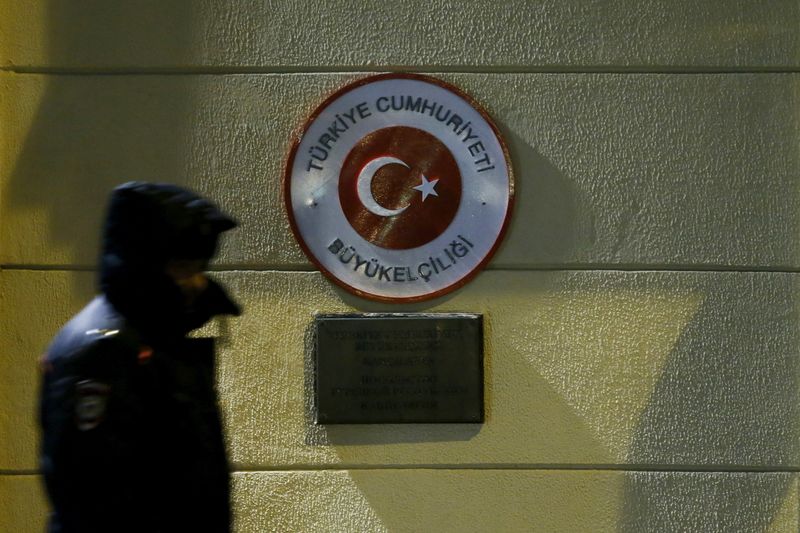By Tuvan Gumrukcu and Jonathan Spicer
ANKARA (Reuters) -A rash of Russian violations of NATO airspace last month has prompted some allies to recall Turkey’s swift and deadly response a decade ago, when it shot down a Russian fighter jet that had crossed over its southern border.
Lithuanian Defence Minister Dovile Sakaliene said in an X post that Turkey “set an example 10 years ago” for NATO as she urged stronger action in the face of Russia’s “tests” today.
In 2015, however, Turkey was left feeling exposed by what it saw as NATO’s tepid response and by the economic fallout from its downing of the Russian jet. This led Ankara eventually – and ironically – to seek closer ties with Moscow that have endured even amid Russia’s war in Ukraine.
TURKEY’S ECONOMY SUFFERED AFTER INCIDENT
On November 24, 2015, a Turkish F-16 jet downed a Russian Su-24 near the Syrian border. Dramatic footage showed the flaming plane careening into a wooded ridge, marking the first such military engagement between a NATO member and Moscow since the creation of the alliance in 1949.
Turkey, which has the second-biggest army in the North Atlantic Treaty Organisation, said it had issued repeated warnings before opting for standing rules of engagement. Moscow denied any violations, froze relations and slapped trade and tourism restrictions on Ankara.
Within hours, NATO had convened an emergency meeting and voiced solidarity over Turkey’s territorial integrity, but also pressed for calm. Its next steps, including surveillance and early-warning flights, were designed to de-escalate, not to court confrontation.
But officials said this still left Turkey feeling vulnerable vis-a-vis Russia, its Black Sea neighbour, with which it was already engaged in a proxy war in Syria, where Moscow backed then-President Bashar al-Assad and Ankara backed the rebels.
“Actions speak louder than words,” said former Turkish ambassador Timur Soylemez, who has experience on U.S. ties.
In the run-up to the incident, the U.S. and other allies withdrew critical defensive assets from Turkey, leaving it to “fend for itself…in the face of persistent airspace violations and threats from missile attacks emanating from Syria”, he said. “This set the scene for the incident and its aftermath.”
Turkey’s economy was hit hard by Russia’s trade curbs and it later issued what Moscow called an apology.
At first, Turkey turned to NATO allies to bolster its defences but decided not to buy U.S. Patriot missiles because of the cost.
Later – driven by a failed coup in 2016 and a rapprochement with Moscow – it bought Russian S-400s, prompting U.S. sanctions and Turkey’s removal from a build-and-buy programme for F-35 jets, fallout that still strains U.S.-Turkish ties.
Turkey’s President Tayyip Erdogan has forged cordial ties with his Russian counterpart Vladimir Putin, refusing to join Western sanctions on Moscow and hosting talks between Russian and Ukrainian delegations, though peace remains far off.
NATO RESPONDS MORE ROBUSTLY TO NEW INCURSIONS
The Ukraine war, now in its fourth year, has transformed Europe’s security landscape, and has threatened in recent months to spill over into NATO member states in Eastern Europe.
Poland downed drones on September 10 over its territory after what Prime Minister Donald Tusk called a “large-scale provocation” by Russia. Estonia said three Russian military jets violated its airspace for 12 minutes on September 19.
Russia denies any hostile intentions against NATO.
Last week, Denmark and Norway temporarily shut their airspace after repeated drone sightings. Denmark pointed a finger at Russia, which denied involvement.
The incursions have prompted a strong and unified reaction from NATO and spurred plans to beef up Europe’s defences.
NATO members now scramble jets within minutes and have convened political consultations under Article 4 of its founding treaty to signal allied unity.
However, NATO has avoided – so far, at least – following Turkey’s example in 2015 of downing a manned Russian aircraft, a move which Putin has said could trigger a dangerous escalation.
(Reporting by Tuvan Gumrukcu and Jonathan SpicerEditing by Daren Butler and Gareth Jones)

